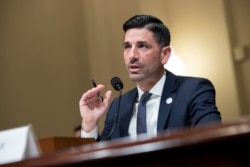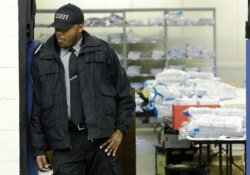U.S. voters who headed to the polls to cast ballots in Super Tuesday primaries encountered scattered problems, some causing long lines or delays, but nothing that could be attributed to foreign interference, U.S. officials said.
The updated assessment late Tuesday came as polling stations were preparing to close in the last of the 14 states and one territory giving voters a chance to determine U.S. President Donald Trump’s opponent in November’s presidential election.
Problems included issues with voter registration databases as well as problems with voting machines in Texas and California.
Website issues
In Minnesota, a tool on the state’s website that helps voters find their polling stations also went down.
“We have obviously sporadic reporting on IT systems issues throughout a number of states,” a senior official with the U.S. Cybersecurity and Infrastructure Security Agency (CISA) told reporters late Tuesday.
“But our understanding at this point is, generally speaking, everything is back up and running,” he added. “We don’t have any reports of malicious cyber activity.”
The update backed up previous assessments by CISA officials, who earlier said there were few signs Russia or other U.S. adversaries had stepped up their efforts to cause confusion or even mayhem as American voters began casting ballots Tuesday.
Concerns had been running high in the weeks leading up to Tuesday’s voting after a series of leaked intelligence reports suggested Russia has been trying to put its mark on the upcoming election by aiming to sway public opinion.
While intelligence officials have denied reports there is any evidence to back up claims that Russia is seeking to boost Trump’s reelection bid, Senator Bernie Sanders confirmed he was advised Moscow was meddling with his campaign to win the Democratic Party nomination.
But so far, a senior CISA official told reporters there was been nothing to suggest any uptick in activity to coincide with Tuesday primary votes.
“There is no spike. There is no appreciable increase,” the official said regarding ongoing influence operations. “There’s just that chronic level of mis- and disinformation, where whether it’s the Russians or frankly anyone else, it’s finding those divisive issues to amplify.”
Fears Russia or other cyber actors might target state election infrastructure, like voter databases, likewise failed to materialize.
A warning to US voters
As a precaution, U.S. security and intelligence officials warned voters Monday to expect foreign actors to try to sway their views as they prepared to vote in key presidential primaries.
“Foreign actors continue to try to influence public sentiment and shape voter perceptions,” the statement, from the departments of State, Defense, Homeland Security and Justice, said. “They spread false information and propaganda about political processes and candidates on social media in hopes to cause confusion and create doubt in our system.”
Earlier Tuesday, acting Homeland Security Secretary Chad Wolf also told lawmakers that the threat, whether it manifested during Tuesday’s primary elections or during the general election in November, is growing.
"We see an ongoing influence campaign by Russia,” he said, adding “We would not be surprised if other adversaries are not also looking at what they're doing."
But Wolf said while election security officials have increased their efforts, some of the responsibility also rests with voters themselves.
"A vital component of this is also the voter, making sure that the voter has information, continuing to push information to the voter to recognize what might perhaps be disinformation, or not reliable information,” Wolf said, pointing to a number of efforts to better educate voters about the need to seek out trusted sources of information and to not rely on anonymous information on social media.
"We're better positioned today than we were four years ago," he added.
2016 election meddling
In an unclassified report following the 2016 U.S. presidential election, the U.S. intelligence community assessed Russia had ultimately sought to help Trump win election.
The U.S. intelligence community also concluded that Russia, as well as Iran and China ran influence operations designed to impact the 2018 elections.
Since then, numerous officials have warned those countries and others, even non-state actors, may try to meddle with the upcoming presidential elections in November. And a report earlier this year from Estonia’s foreign intelligence service also warned meddling by the Kremlin was likely.
"Russia wants to show that the West is failing to hold fair elections," it said.
Some election security officials and analysts caution that while more significant information operations or cyberattacks may yet target U.S. voters, so far, Russia has been content to stick with its 2016 social media playbook.
"In general from Russian state-backed media, we’ve seen a focus in their primary coverage on the division within the Democratic Party and the idea that the elections are “rigged” against Bernie Sanders,” Rachael Dean Wilson, with the Alliance for Securing Democracy, said of the activity by 140 Russian-linked diplomatic and media accounts on Twitter.
But other experts say unless something changes, Russia in particular, has no reason to change what it sees a successful election-meddling formula.
“I don’t think the cost-benefit ration has been increased enough for them to roll out new stuff, frankly,” said Nina Jankowicz, a disinformation fellow at the Wilson Center’s Science and Technology Innovation Program.
“We’ve not increased the costs, as the U.S. government, to deter Russia or any other bad actor from engaging in these behaviors,” she said. “In fact, I would argue that we have actually normalized that behavior.”
Despite signing an executive order ahead of the 2018 elections authorizing the use of sanctions against any country found to have meddled in that election, such sanctions have only been applied once, against a Russian oligarch in September.
Still, Tuesday’s statement by U.S. security and intelligence officials warned any meddling will not go unpunished.
“We continue to make it clear to foreign actors that any effort to undermine our democratic processes will be met with sharp consequences,” it said.






